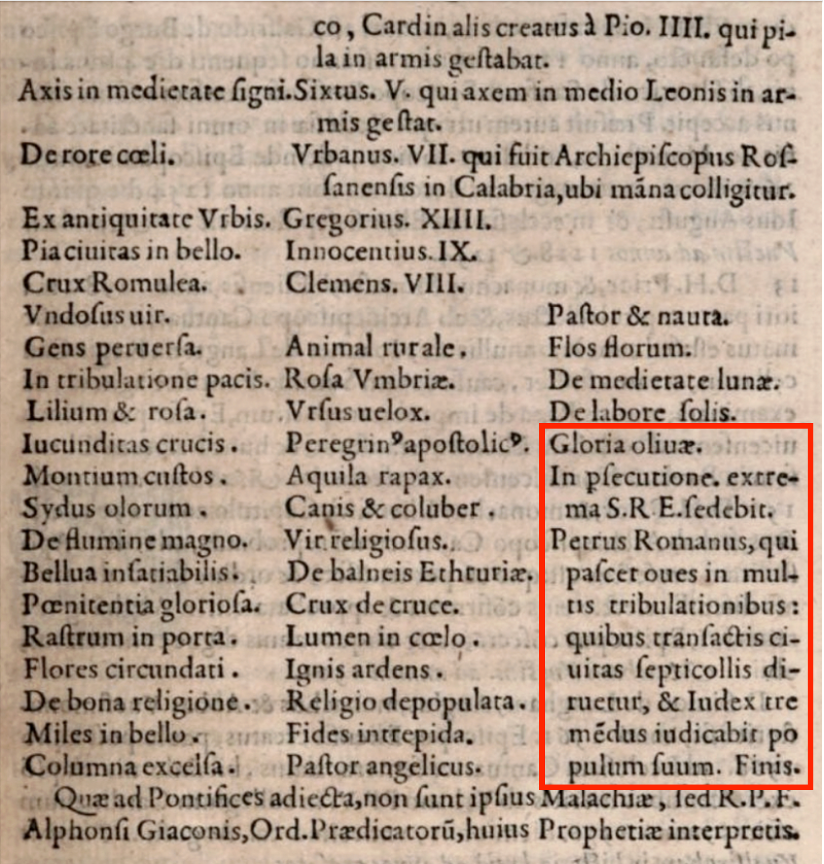Feast Day: November 3rd

Around 1590 a Benedictine Monk, Arnold de Wion, published a grand text on the history of the Order of St. Benedict, his “Lignum Vitae”. You probably have never heard of him, or his book, but you may have heard of a few pages found within it. Page 311 is included here, and the text inside that red box can be translated:
The Glory of the Olive
In the final persecution of the Holy Roman Church, there will sit [i.e., as bishop].
Peter the Roman, who will pasture his sheep in many tribulations, and when these things are finished, the city of seven hills will be destroyed, and the dreadful judge will judge his people. The End.
This, my friends, is St. Malachy’s famous “Prophecy of the Popes”, a list of 112 cryptic Latin phrases penned, it is claimed, by the 11th century Irish Bishop, referring to 112 Holy Fathers, beginning with Celestine II … and if you count forward 112 popes to this final “Peter the Roman”, you find that this final line would refer to our very own Holy Father Pope Francis.
The story goes that St. Malachy traveled from Ireland to Rome in 1139 to retrieve the pallium (actually two) for the Archbishoprics of Armagh and Cashel. He had grown up near Armagh, in Northern Ireland, having spent the latter years of his young life living with a hermit, Imhar O’Hagan after his parents had both died, though not before they had raised him in the faith. The labors and conversions of St. Patrick had been forgotten in the intervening several centuries, with some in Ireland returning to paganism, and many now only nominally Christian, not knowing the faith or trying to life a life like Jesus. Malachy dedicated his life to changing that, beginning with his own holiness as a disciple of O’Hagan, and later working industriously as a bishop especially for the holiness and training of his priests.
It was a crazy age. Vikings periodically invaded and different clans battled each other to put their sons on the episcopal throne. In 1129, Archbishop Celsus, knowing his saintliness, named Malachy his successor as Archbishop of Armagh. The custom being at that time that the title should have been given to a member of his family, the Celsus clan instead installed Murtagh on the throne, and then Niall when Murtagh died a few years later. The scene may be humorous to us now: Niall stealing the golden crozier and Book of the Gospels stretching back to St. Patrick from the Cathedral and roiling the crowds into defending his right to the office. Malachy refused to engage his clan in battle staying far away from the church outside of town. Then the Celsus clan invites Malachy to a “meeting”, intending to do him harm, but instead they are moved by his humility and kindness and boot out Murtagh to give the see to its rightful bishop (though they did charge Malachy the cost to get back those relics… so much for Christian charity…)
In any case, it meant that in 1139 St. Malachy was bringing his report to Pope Innocent II in Rome, and there, the tale is told (this from Abbé Cucherat in the 1700s), that the holy bishop had a vision of the future of the Church and gave it to the Holy Father, that long list of enigmatic characteristics of future popes. And then it was placed it in a Roman archive and forgotten for 400 years.
Only one problem: even St. Bernard of Clairvaux, who St. Malachy stopped to visit on his way back from Rome, (and in whose arms St. Malachy would die on a later trip back to Rome in 1148), and who wrote a biography of St. Malachy a few years after his death, does not mention this prophecy at all. Nobody knew about this famous list until it conveniently appears right before a Papal Conclave in 1592. There having been a couple of back-to-back conclaves, tensions were high, and with this prophecy showing up right then, St. Malachy handily offered a ‘prophecy’ (Pope #75) that endorsed Arnold de Wion’s favorite candidate, Cd. Simoncelli. Also interesting to note: it is easy to apply the characteristics to each pope up to 1590, and strained for most in the years since.
– Fr. Dominic finds this a fascinating old document. But if we’re looking for drama and intrigue and actions that impact the future, St. Malachy’s hardiness in toil, humility in leadership, self-sacrifice for the good of the Gospel, and friendship with St. Bernard all matter more to the Church today than a cryptic document ascribed to him. And if Pope Francis is our final Holy Father, then we’d be better off preparing our souls, and our world, to meet Christ, then any time spent scouring old archives, or diving down any other interesting rabbit holes.